|

   
Screenplay by Ian McKellen and Richard Loncraine
| SCENE 17
INT. WASHROOM - THE PALACE - NIGHT
RICHARD flings open the door of the
stately lavatory and makes for the WC cubicle, past the ornate,
carved mirrors above the deep washstands, with their gold taps and
luxurious selection of towels, brushes, soaps and lotions. In the
distance, the DANCE BAND plays 'A Delightful Measure'. |
scene 17 is set in an ante-room
at Strawberry Hill House, refurnished with plastic urinals and
washbasin - a private place where Richard could look at himself in
a mirror. My first idea had been to see Richard alone, talking in
front of a three- sided mirror in his bedroom. My second had him
leaving the Ball via the Palace Mews, where Ratcliffe was waiting
to drive him to The Tower and where he first spies Tyrell, the
stable-lad, grooming Richard's beloved horses. My third, if the
Ball were onboard the royal yacht, put Richard in the most private
of places, the loo of the royal retiring accommodation.
|
RICHARD
(continuing)
. . . capers nimbly in a lady's
chamber,
To the lascivious pleasing of a lute.
But I, that am not shaped for sportive tricks,
Nor made to court an amorous looking-glass,
I, that am rudely stamped -
Deformed, unfinished, sent before my time
Into this breathing world, scarce half made up,
And that so lamely and unfashionable
That dogs bark at me, as I halt by them:
|
'To the lascivious pleasing of a
lute.' The repeated L's trip off the tongue, as the speech
turns from rhetoric to a confessional tone. We have just seen King
Edward capering nimbly on the dance-floor.
At the RNT, this opening speech was spoken directly to the
audience to intensify their identification with the speaker; a
powerful asset which Shakespeare generally reserves for his
leading characters. In the play, there is an effective group of
adjacent monologues from Buckingham (4.2), Tyrell (4.3) and Queen
Margaret (4.4). In the film the device is reserved for Richard.
Without it, the audience might find it hard to engage
sympathetically with a man so bent on ill-doings. Similarly the
troubled and troublesome inner natures oflago, Leontes and Macbeth
are revealed in their soliloquies.
In the theatre, audiences welcome a character who steps out of
the action of the drama to address them, whether in Shakespeare, a
pantomime or a musical. On the television screen, talking heads
are so familiar that a Shakespeare soliloquy works well. The rule
of traditional film-making is that actors should never look at the
camera - a convention which is riskier to break through than the
fourth wall of a proscenium stage.
I never doubted that I should challenge the naturalism of
cinema by talking to the camera.
|
RICHARD
pulls the chain and emerges to wash his hand.
|
|
RICHARD
(continuing)
Why, I, in this weak piping time of
peace,
Have no delight to pass away the time,
Unless to spy my shadow in the sun,
And descant on my own deformity.
|
|
RICHARD looks in
the mirror at his blasted, sagging, left profile, the Brylcreemed
hair smooth over his alopeciaed dome. He dries his right hand . .
.
RICHARD
(continuing; his lips scarcely move as he
addresses both himself and the CAMERA
through the mirror)
|
|
Why, I can smile; and murder while I
smile;
And wet my cheeks with artificial tears
And frame my face to all occasions!
And, therefore, since I cannot prove a lover,
I am determined to prove a villain
And hate the idle pleasures of these days.
Plots have I laid . . .
|
'Why, I can smile; and murder while
I smile;
And wet my cheeks with artificial tears
And frame my face to all occasions!'
I included these lines from Richard of Gloucester's speech in
Henry VI part 3 (3.2). Olivier's screenplay plundered more.
Richard is not a cry-baby but he will weep twice in the film - by
design with Lady Anne and for real after his nightmare on the eve
of battle.
'I cannot prove a lover . . .' Richard's wooing of Lady
Anne in scene 23 may seem to contradict this confession. I
preferred to take it literally - that Richard has had little
success with sex, because he doubts anyone could find him
physically attractive and has devoted himself exclusively to his
career as a full-time soldier.
'hate the idle pleasures of these days.' Richard allies
himself with other military malcontents, like Don John in Much Ado
About Nothing who takes revenge on society for his bastardy just
as Richard does for his deformity. |
| SCENE 18
INT. WALKWAY - THE PALACE - NIGHT
As RICHARD returns to the celebrations he
looks down from the cast-iron walkway that leads back to the
ballroom.
RICHARD
(continuing to CAMERA)
To set my brothers, Clarence and the
King,
In deadly hate, the one against the other.
|
|
| SCENE 19
EXT. LANDING STAGE/MILITARY LAUNCH -
THE PALACE - NIGHT
Far below on the stone steps of the Thames
Embankment RICHARD spies his brother CLARENCE, with BRACKENBURY
and ESCORT, as he is led down to a waiting launch.
|
scene 19. This pier-head is just
across the road from the palace of the Archbishop of Canterbury in Lambeth, south London. In the distance are the
Houses of Parliament, one of the few London landmarks glimpsed in
the film. The structure of the pier was a little decorated with
Gothic shapes.
Although the River Police had given their permission, one of
their boats sped across as we filmed, to complain that our
arc-lights might dazzle the navigators of the tourist boats and
the occasional barge collecting waste upstream. Fortunately there
was little river traffic that night and we didn't have to wait
long for it to pass.
|
| SCENE 20
INT. WALKWAY - THE PALACE - NIGHT
RICHARD watches, turns and walks away.
|
|
| SCENE 21
EXT. PALACE - LANDING STAGE/MILITARY
LAUNCH - NIGHT
RICHARD emerges from the dark tunnel that
leads to the Palace landing stage.
RICHARD
(continuing; calling over to CLARENCE)
Brother! What means this armed guard?
RICHARD hurries to CLARENCE down the
slippery stone steps.
CLARENCE
His Majesty,
Tendering my person's safety, has appointed
This conduct, to convey me to the Tower.
RICHARD
But what is the matter, Clarence, may I
know?
CLARENCE
Yes, Richard, when I know; but I
protest As yet, I do not.
RICHARD
Why this it is, when men are ruled by
women!
It's not the King that sends you to the Tower.
Elizabeth the Queen, Clarence, it's she.
We are not safe, brother. We are not safe.
BRACKENBURY
I beseech your Lordships both to pardon
me.
His Majesty has strictly given me charge
That no man shall have private conference -
Of what degree so-ever - with your brother.
BRACKENBURY invites CLARENCE on board the
military police launch moored in the river.
RICHARD
We speak no treason, Brackenbury. We
say the King
Is wise and virtuous and his Queen -
Well-struck in years.
BRACKENBURY
(refusing to be amused)
I do beseech you both to pardon me.
CLARENCE
We know your charge, Brackenbury, and
will obey.
|
scene 21. The standard practice
is to shoot a scene from a number of angles. A 'master-shot'
showing all the action can then be inter-cut with closer shots of
the speakers. This scene, however, was filmed from just one angle.
RL often opted for a single set-up which continues throughout a
scene, because it gives the actors a chance to control the pace
and the changing moods. Anyway, he wasn't given enough time in the
ten-week shooting schedule for the luxury of a number of set-ups.
He kept in his head the way the film would eventually be cut
together and only shot what was necessary; a discipline he has
perfected in his filming of commercials. Of the 500 set-ups in
Richard III, the editor, Paul Green, had to discard only eight.
Each new set-up involves re-lighting. I'm often resentful of
the time permitted for the essential preparation of camera
positioning and lighting the set and faces. That done, the actors
seem to be expected to get it right without delay whilst producers
look at their watches and frown. But I could never have resented
the wait while Peter Biziou dextrously painted the air with light.
By walkie-talkie or whispers or sign language, he communicated
with his chief gaffer, Peter Bloor, and the assistant electricians
who lugged, stabilised and plugged-in for action the lamps behind
the camera. From the day we met at my make-up test, Peter was
encouraging: initially because he agreed to take the job - he is
in great demand - and to the end, because he enthused about
performances and direction and about his own satisfaction in being
involved.
|
RICHARD
(hugging CLARENCE)
We are the Queen's subjects, and must
obey.
Brother, farewell. I will unto the King.
Meanwhile, this deep disgrace in brotherhood
Touches me deeper than you can imagine.
CLARENCE
I know it pleases neither of us well.
RICHARD
Well, your imprisonment shall not be
long.
I will deliver you, or else lie for you.
Meantime have patience.
CLARENCE ironically holds up his
handcuffs.
CLARENCE
I must perforce. Farewell.
RICHARD looks down from the quay and takes
out a large, white handkerchief, to dry his sniffles. He waves to
CLARENCE, as the launch speeds cross-stream, out toward the
sinister silhouette of the menacing Tower on the opposite
embankment. The moonlight glitters on the grey water.
|
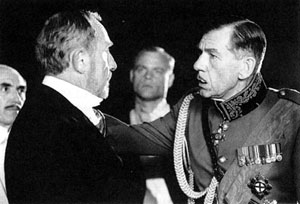
'Brother, farewell.'
In the play, Clarence has a young son and daughter. In the
film, he is a childless bachelor, as simple and plain as his
brother Richard is devious. He has withdrawn from the political
life of his two brothers and has a job elsewhere, in some world of
academics or artists. RL, who collects cameras, decided Clarence
should be an amateur photographer, recording his surroundings
without noticing what's going on until it is too late. Right up to
his death, Clarence is fooled by Richard's bonhomie.
Nigel Hawthorne was a master of irony and British
sang-froid, witness the Yes Minister television series (1980-7).
As Clarence, he played on the other side of his own personality,
warmly and wistfully.
|
RICHARD
Simple, plain Clarence! I do love you
so,
That I shall shortly send your soul to Heaven -
If Heaven will take the present from my hands!
(blowing his nose)
And then, I'll marry . . .
"What though I killed her husband? And his father? |
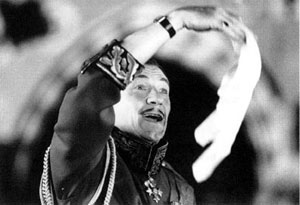
'Simple, plain Clarence.' This scene is
full of ironies, as Richard lies his way through. His adrenalin
gleefully pumping, he can hardly wait to share his deviousness
with the audience. Then off he springs to give the performance of
his life, as he woos Lady Anne: from a parody of brotherly love to
a parody of courtship.
|
| SCENE 22
INT. CORRIDOR - PUBLIC HOSPITAL - DAY
The messy aftermath of civil conflict. The
corridor is crammed with the sick and dying. LADY ANNE is elegant
in her mourning black but distraught and scarcely recognised in
headscarf and dark glasses, as she glides through the crush.
WIDOWS and fatherless FAMILIES wait for
confirmation of their menfolk's deaths. The SICK AND WOUNDED
overflow from the adjacent wards. LADY ANNE pushes open the double
swing-doors to the mortuary. |
scene 22. At the RNT, Bob
Crowley's hanging line of overhead lamp-shades indicated a
mortuary corridor, with three orderlies in charge of the corpse on
its hospital trolley. We filmed in the abandoned Pearl Assurance
Building (designed by Mokton, 1912) on the edge of the City of
London in Holborn. On either side of the corridor in this scene,
there are heavy steel doors which can still be opened on to the
cell-like safes where securities and valuables were once locked up
and guarded. |
| SCENE 23
INT. MORTUARY - PUBLIC HOSPITAL - DAY
Through the opaque glass tiles of the
ceiling, cathedral-like sunbeams fall onto the tiled walls and
marble floor of the underground chamber. Cold and quiet after the
confusion outside.
Three white-coated HOSPITAL ORDERLIES are
attending to the corpse of PRINCE EDWARD on its marble plinth. His
wounds have been sewn up and tidied. Scalpels and other surgical
implements are at hand. Prominent is an empty coffin on a gurney.
The shock of her husband's death has now
released LADY ANNE's grief and anger. Her mascara has run down her
pale make-up. She gestures to the ORDERLIES to leave her alone.
|
scene 23. A defunct lower-floor
storage-room was turned into a basement mortuary by foreshortening
the windows with plasterboard and paint. I love the details of
film-sets, all ready, if necessary, for a camera close-up. One
joke was not filmed. On the long mortuary wall at the back, there
were dummy refrigerator doors, labelled with the surnames of
Shakespeare's contemporary rivals - Dekker, Greene, Jonson, Kyd,
Marlowe, Marston and Massinger.
PRINCE EDWARD. In the play. Lady Anne accompanies her
father-in-law's corpse to its burial. In the film, his son is
recognisable on the morgue's marble slab. Olivier's film made the
same substitution. The war in which the Prince was killed has been
over long enough for the new regime to celebrate its victory but
his corpse is not yet buried and Lady Anne's grief is still at its
height. Shakespeare's time-scale is only confusing when you
analyse its inconsistencies.
|
LADY ANNE
0, cursed be the hand that made these
holes;
Cursed the heart that had the heart to do it;
Cursed the blood that let this blood from hence!
If ever he have child, abortive be it.
If ever he have wife, let her be made
More miserable by the life of him,
Than I am made by my young husband's death.
RICHARD has been watching through the
glass panels of the doors. LADY ANNE hears the door open and turns
to see RICHARD.
|
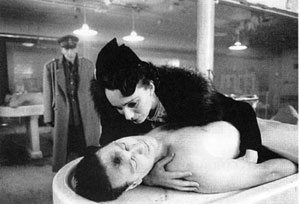
'If ever he have wife . . .' In the background, Richard
silently emerges from behind Lady Anne, his future wife, at the
moment when she curses herself-to-be.
|
LADY ANNE
What black magician conjures up this
fiend,
To stop devoted charitable deeds?
RICHARD
Sweet saint, for charity be not so
cursed.
LADY ANNE
Foul devil, for God's sake hence and
trouble me not;
For you have made the happy earth my hell.
RICHARD does not move. LADY ANNE, unnerved
by his gaze, tries to shame him into a response.
LADY ANNE
(continuing)
If you delight to see your heinous
deed.
Behold this pattern of your butchery.
RICHARD acknowledges the man he has
killed.
RICHARD
(soothingly)
Lady, you know no rules of charity.
LADY ANNE
Villain, you know no law of God nor
man.
RICHARD
Vouchsafe, divine perfection of a
woman, Of this supposed crime to give me leave, By circumstance,
but to acquit myself.
LADY ANNE
Did you not kill my husband?
RICHARD
I grant you, yes.
LADY ANNE
D'you grant me, hedgehog? Then God
grant me, too,
You may be damned for that wicked deed!
RICHARD
Gentle Lady Anne -
LADY ANNE
0, he was gentle, mild and virtuous.
RICHARD
The fitter for the King of Heaven who
has him.
LADY ANNE
And you unfit for any place but Hell!
RICHARD
Yes, one place else, if you will hear
me name it.
LADY ANNE
Some dungeon.
|
'black magician . . .' In the
play, there are other references to necromancy. Richard bases his
slanderous charge against Clarence on the witness of a wizard; he
calls Queen Margaret a 'foul wrinkled witch'; he blames his
deformity on 'damned witchcraft'. If this is thought to be
outlandishly medieval for the 1930s, there have been many modem
world leaders in thrall to astrology, from Hitler to Reagan.
'happy earth . . .' Richard notes to himself that Lady
Anne's particular happiness lies not just in love but in being
married to the late heir-to-the-throne, with the promise of
influence and riches as his consort. She does not need to have it
explained in words, that a liaison with Richard would lead her
back to those privileges: cf. the youthful widow Jackie Kennedy's
marriage to Aristotle Onassis.
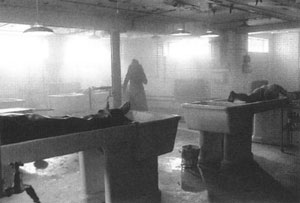
In the foreground of this establishing shot of the mortuary as
Lady Anne walks in, there are two battle-torn extras, genuine
amputees. In an early draft, the wooing was set over the King's
corpse as it lay in state, next to the new mausoleum to his son,
Lady Anne's husband.
On the page, it seems incredible that Lady Anne would ever
succumb to her husband's killer. In performance, the scene (1.2)
is invariably convincing. Lady Anne's emotional juices are in full
flood, as her grief and anger turn to curiosity and the need to be
involved with the world once more. She is not out of control and
Richard has to work hard to melt away her scathing wit with his
sincerity. He plays too on her vanity and declares that his love
for her led him to murder the men he should have taken prisoner.
He even offers to kill himself, with conviction.
|
RICHARD
(to himself)
Your bedchamber.
(out loud)
Let's leave this keen encounter of our
wits.
Your beauty, that did haunt me in my sleep,
Could make me undertake the death of all
the world,
So I might live one hour in your sweet bosom.
LADY ANNE
If I thought that, I tell you,
homicide,
These nails should rend that beauty from my cheeks!
RICHARD
My eyes could not endure that beauty's
wreck.
As all the world is cheered by the sun,
So I by that - it is my day, my life!
He who bereft you, Lady, of your husband,
Did it to help you to a better husband.
LADY ANNE
His better does not breathe upon the
earth.
RICHARD
He lives who loves you better than he
could.
LADY ANNE
Where is he?
RICHARD
Here.
|
'Your bedchamber.' Kristin Scott
Thomas did not want to hear this as it would lessen the later
shock of Richard's approach which makes her spit. It does not
disrupt the flow nor make Richard's sincerity any less convincing,
when whispered in confidence to the camera - one of the very few
brief 'asides' other than the full- length monologues. Richard
likes an audience to appreciate his ingenuity. In the play, the
wooing is silently witnessed by Tressel and Berkeley and by the
undertakers who attend to the corpse.
'These nails should rend that beauty from my cheeks!'
Lady Anne accepts that she is beautiful - at least, she does not
deny it. Even as she lambasts him, she is susceptible to Richard's
flattery.
'He who bereft you. Lady, of your husband . . .' The
audacity of the soothing euphemism and the mocking repetition of
'husband' always made theatre audiences laugh. |
|
LADY ANNE spits full in RICHARD'S face. He
glares murderously back at her. She recoils from his anger. But
this is not the first time that the deformed RICHARD has been
openly despised. She cannot bring herself to apologise or, quite,
to feel sorry for his half-pathetic expression.
As they stare each other out, a young,
helpless widow and the man old enough to be her protective father,
there is a sexual alarm in the space between them.
At last, RICHARD wipes his face dry, with his white handkerchief.
RICHARD
(continuing; softly, almost forgiving)
Why do you spit at me?
LADY ANNE
(recovering her self-control)
Would it were mortal poison, for your
sake.
RICHARD
Never came poison from so sweet a
place.
LADY ANNE
Never hung poison on a fouler toad.
Out of my sight! You do infect my eyes.
|
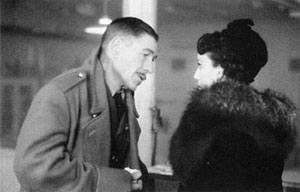
LADY ANNE spits. This is a point
of no return.
However satisfying it may be to spit contempt at her enemy, she is
shocked by her own vulgarity and is silent while Richard weeps and
tells his tale. He makes no complaint. The thrill of this
slow-motion chase is that the stoat never underestimates the
rabbit and takes no chances. Richard's energy, as befits an active
soldier, flows through each moment as if it were a matter of his
life and death.
As they stare each other out. In the screenplay,
particularly in this final version, I was encouraged to fill out
the moments between the dialogue with some indication as to the
passionate inner lives of the characters, so that their stories
would be clear to those readers who were more used to scripts
which are not by Shakespeare and in which action and explosions
sound louder than words. I do not like inhibiting and restricting
notes on acting from playwrights when they are written into their
scripts as stage directions: but this screenplay is not intended
to be an acting script.
|
RICHARD
(he is crying now)
Those eyes of yours from mine have
drawn salt tears.
But when I heard the story of my father's death
And all the standers-by had wet their cheeks,
Like trees bedashed with rain, in that sad time,
My manly eyes did scorn a humble tear:
And what that sorrow could not thence exhale,
Your beauty has and made them blind with weeping.
Teach not your lip such scorn, for it was made
For kissing. Lady, not for such contempt.
LADY ANNE is moved by this confession and
RICHARD risks offering to kiss her. But no: LADY ANNE turns away.
|
'blind with weeping.' cf. 'I can . . . wet my cheeks
with artificial tears' (scene 16). Richard is able to cry
convincingly by recalling previous occasions when he has been hurt
by revulsion from his appearance.
To dry my eyes, I used the same white handkerchief which
waved-off Clarence to The Tower (scene 21). |
RICHARD
(continuing)
If your revengeful heart cannot
forgive,
I humbly beg for death, upon my knee.
RICHARD takes the nearest, sharpest
scalpel and hands it to LADY ANNE.
RICHARD
(continuing)
No, do not pause - it was I who killed
your husband;
But it was your heavenly face that set me on.
LADY ANNE almost dares to stab him but she
is too confused. Why is her enemy so attractive? She drops the
scalpel and it clatters onto the floor.
RICHARD
(continuing)
Take up the blade again - or take up
me.
RICHARD offers the blade to LADY ANNE but
she will not take it from him.
LADY ANNE
I will not be your executioner.
RICHARD
Then, bid me kill myself and I will do
it.
LADY ANNE
I have already.
RICHARD
That was in your rage. Speak it again.
LADY ANNE
I would I knew your heart.
|
'I humbly beg for death, upon my
knee.' Richard inspires himself by playing the fantasy role of
romantic lover. In the mirror he has razored a moustache of screen
heroes like Clark Gable, Clifton Webb, David Niven, Douglas
Fairbanks. When his declaration of love is rejected, Don Juan
kneels to be punished, kneels to commit hari-kari at the
executioner's block and simultaneously kneels to ask for her hand
in marriage. Not all women would fall for it and, watching the
film, I can never quite catch the moment when Lady Anne is won
over. She never quite remembers herself (scene 73).
'No, do not pause -' 'Nay' Shakespeare wrote and as in
the north of England we still use the word, I had to be convinced,
mainly by myself, that there should be no irksome hooks on which
audiences could hang their impatience with a text they found
initially difficult to understand. All the 'thou's and 'thee's of
my childhood have gone too. Shakespeare makes no distinction
between 'thou' and 'you' that I can tell.
Kristin Scott Thomas as Lady Anne was much more than another
name to boast
of on the marquee. Acting with her was always instructive. Our
analysis of this scene in rehearsal was inconclusive - RL
uncertain whether Lady Anne's submission could be believable; I
convinced that it could; and Kristin listening, head on one side,
and grimacing wryly that perhaps a woman knew best. In front of
the camera she embodied the character's emotions with an intensity
that reminded me of Meryl Streep's enviable ability to forget
herself as soon as the camera turns. Kristin's special quality
onscreen is to encapsulate and minimise her naturally volatile
expression of personality, without losing any of its variety.
Subtle as she is in close-up, she is equally aware of the effect
of her body's silhouette in long-shot as in scene 44.
|
|
RICHARD places the blade to his throat. A
drop of blood trickles from the glistening blade.
LADY ANNE
I fear that it is false.
RICHARD
Then never was man true.
LADY ANNE
Well, well, put down the blade.
RICHARD
But shall I live in hope?
LADY ANNE
All men I hope live so ...
At that ambiguous half-promise, RICHARD
lets drop the scalpel. He slowly lifts his right hand to his mouth
and, with his teeth, pulls off his family signet-ring.
|
RICHARD places the blade to his throat. Richard uses a
handy scalpel. In the play (1.2) he lays his 'true breast naked to
the deadly stroke' of his sword. This would indicate that
Shakespeare was presenting the one and only time when undressing
is in order. Onstage, I removed hat, gloves, greatcoat, Sam
Browne's trappings, jacket and undid the collarless shirt to give
Lady Anne a glimpse of the naked flesh that was so close to the
spine's deformity and was hers to explore. As I was nightly aware
that this was an actor's trick, mine as much as Richard's, I was
almost relieved when RL didn't want me to repeat it in the film.
|
RICHARD
Vouchsafe to wear this ring.
RICHARD slides the ring, wet with saliva,
onto her engagement finger.
LADY ANNE
To take is not to give.
RICHARD
(whispers)
May I, with all expedient duty, see
you?
LADY ANNE looks at the contrite RICHARD.
Her grief has turned to open fascination.
LADY ANNE
And much it joys me too,
To see you are become so penitent.
RICHARD
(as he leaves)
Bid me farewell.
LADY ANNE
'Tis no more than you deserve;
But since you teach me how to flatter you,
Imagine I have said farewell already.
RICHARD turns and walks out into the
corridor. |
'Vouchsafe to wear this ring.' Richard performs a crude
marriage ceremony between beauty and the beast. Lady Anne can have
few illusions that he will turn into a prince to rival her first
husband. In the play, there is no direct reference to the marriage
until Richard and Anne become King and Queen. She only re- appears
to meet the other royal women immediately before the Coronation
(4.1). She is overwhelmed by sadness and is impervious to other
feelings by then. She has even smaller joy than her predecessor in
'being this country's queen'. She is childless although the
historical Anne had a son who died aged ten.
Despite considerable cutting of lines throughout this scene,
each step in Richard's seduction remains. In the film, Lady Anne
appears in nine more scenes than in the play - most of them
silently. This prepares for her heart-breaking confession, which
is divided between scenes 73 and 93. It also steadily charts
Richard's inadequacy as a husband. In marriage, he behaves as
callously as he does elsewhere.
|
| SCENE 24
INT. CORRIDOR - PUBLIC HOSPITAL - DAY
RICHARD pauses outside the double-doors to
the mortuary.
RICHARD
(to himself)
Was ever woman in this humour wooed?
(to CAMERA)
Was ever woman in this humour won? |
scene 24. Onstage, having undressed
enough to show Lady Anne my chest, I put everything back on as quickly as I could, single-handed, meanwhile
talking to the audience. Then I marched off to a score or two of
tailors. All that survives of this cheeky theatricality is the
final wriggling-on of his leather glove, as Richard solemnly
climbs the stairs from the mortuary.
|
| SCENE 25
INT. STAIRS - PUBLIC HOSPITAL - DAY
RICHARD starts up the stairs.
RICHARD
(continuing, to CAMERA)
I'll have her. But I will not keep her
long.
What? I, who killed her husband and his father,
To take her in her heart's extremest hate,
With curses in her mouth, tears in her eyes,
And yet to win her - all the world to nothing. Ha!
RICHARD pauses, then strides down the
corridor. |
scene 25. This celebratory soliloquy of triumph is properly
outrageous and breaks through the convention of naturalism as effortlessly as a song in
a musical. Richard, who will never be so carefree again, dares to
speak his mind and boast even within hearing of hospital patients,
staff and visitors, all of whom are too preoccupied to notice him
dancing through.
|
| SCENE 26
INT. UPPER CORRIDOR - PUBLIC HOSPITAL -
DAY
RICHARD
(continuing)
Upon my life she finds, although I
cannot,
Myself to be a marvellous proper man.
I'll entertain some score or two of tailors
To study fashions to adorn my body.
(half-singing)
Shine out, fair sun, till I have bought a glass,
That I may see my shadow as I pass.
Immaculate once more, RICHARD strides out.
The sun throws his shadow back onto the marble floor. |
'I'll entertain some score or two of tailors . . .' Forty tailors
indeed! In an interim screenplay, I unnecessarily illustrated these words
with a visit to a tailor's shop, where Richard was measured and
fitted for his new civilian wardrobe. On his way out, he ripped a
war veteran begging in Savile Row.
'Shine out, fair sun . . .' The end of the scene is marked with
the flourish of a rhyming couplet. It sent me prancing up the curving stairs. On the
take used in the film, I spontaneously paused at the top, for
another full-stop to the scene, a clenched fist flung in the air
before leaving round the comer.
|
| SCENE 27
INT. THE KING'S LIBRARY - THE PALACE -
DAY
Heavy early Victorian decor.
KING EDWARD is at his desk, his well-worn
face the victim of asthma, blood-pressure and general over-
indulgence.
QUEEN ELIZABETH is leaning over his
shoulder approvingly as he signs an official paper. CATESBY has
prepared the sealing wax for the Royal Seal.
KING EDWARD hands CATESBY the completed
missive. QUEEN ELIZABETH smiles with relief that CLARENCE'S Royal
Pardon is on its way.
As CATESBY leaves with a bow, KING EDWARD
starts a serious cough. CATESBY turns, very worried, and QUEEN
ELIZABETH tries to help her husband. CATESBY rings the bell for
further assistance. The NURSE rushes in to attend her patient. |
scene 27. In the dubbing studio was added 'Catesby!' from Queen
Elizabeth, her
first word in the film. It introduces the King's permanent private
secretary, which was how he was played at the RNT. Tim Mclnnerny
gives a convincing inner life to the sour looks and gliding gait
of a senior representative of the Civil Service.
KING EDWARD. John Wood's career began supporting the young Richard
Burton in three Shakespeare seasons at the Old Vic. He has played
Richard III twice, first as an undergraduate at Oxford (1953) and
then for the RNT (1979). For a time, he was indispensible to any
new Tom Stoppard play. We played together in Every Good Boy
Deserves Favour, Stoppard's collaboration with Andre Previn. On
Broadway, John had already triumphed as Guildenstern and in Travesties. After
Richard III, his next film (and mine) was
Rasputin (HBO).
CLARENCE'S Royal Pardon. Later, King Edward will refer to this
order in
scene 47. Under Richard's influence, he had issued an earlier
order that Clarence should be executed. In this scene he issues a
pardon. Scene 29 follows silently on, as Richard reads and
destroys the countermand. |
| SCENE 28
INT. THE QUEEN'S QUARTERS - THE PALACE
-DAY
QUEEN ELIZABETH'S taste is reflected in
every knick- knack and pattern of the newly furnished apartments.
A clock strikes 10 and then tick-tocks. Breakfast is served in the
conservatory leading onto the Palace gardens. The summer morning
sunlight filters through the trees outside.
QUEEN ELIZABETH is déshabillé, a
champagne-glass in her manicured, be-ringed hand.
RIVERS is brunching on orange juice, black
coffee and Danish.
At his own small table, the well-behaved PRINCE JAMES is absorbed
with a boiled egg and toast-soldiers. The adults speak low, so as
not to distract him.
QUEEN ELIZABETH
The King is sickly, weak and melancholy.
RIVERS
(joining her at the window)
Have patience. Sister.
There's no
doubt His Majesty
Will soon recover his accustomed health.
QUEEN ELIZABETH
But his physicians fear him mightily.
If he were
dead, what would become of me?
RIVERS
The heavens have blessed you with two goodly sons,
To be your comforters when he is gone.
|
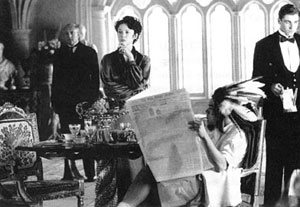
scene 28. The undercroft of the chapel in Lincoln's Inn Fields,
where lawyers train and work, has vaulted arches that are open to
the air. These were glazed, creating a unique royal
breakfast-room, furnished by the new Queen Elizabeth with
gold-fish tank, chintz and a family atmosphere.
All Annette Bening's scenes were shot together within three weeks
at the beginning of the schedule. Warren Beatty boosted all our
spirits when he came to visit her on the set for this scene. Ten
years before, he had troubled to call RL, whom he had never met,
to congratulate him on his direction of The Missionary. When we
needed to break all the Hollywood etiquette rules of agents,
managements and personal representatives by contacting Annette
quickly and directly, RL called the old Beatty number and Warren
answered. Mrs Beatty read the script the minute it reached her
(another broken rule of some stars - "keep 'em
sweating"). She at
once agreed to play Queen Elizabeth and I've been grateful and
delighted ever since. I know she was glad to return to Shakespeare
which she had played during her time at the American Conservatory
Theater in San Francisco.
|
QUEEN ELIZABETH
(dropping the bombshell)
0 they are young and
their minority
Is put into the trust of Richard Gloucester -
A man
who loves not me, nor you, dear brother.
RIVERS
Is it confirmed he will be Lord Protector?
QUEEN ELIZABETH
If the King miscarry . . .
KING EDWARD is at the doorway, helped by PRINCESS ELIZABETH. He
belies his illness by his confident manner.
KING EDWARD
My love, what danger can befall to you
So long as
Edward is your constant friend?
And a sovereign, whom Richard must
obey?
Yes, whom he shall obey - and love you too.
KING EDWARD and QUEEN ELIZABETH embrace each other.
RIVERS thoughtfully sips his coffee.
PRINCE JAMES dunks another
soldier. |
'0 they are young . . .' reveals the worried, doting mother in
juxtaposition to the carefree hostess who has been seen dancing
with her little son on her toes. It is always revealing to spy
public figures off-duty.
RIVERS. Before he speaks, spot the clues that Rivers is American.
Off the Pan American flight he, in a republican sort of way, drops his
gift-wrapped bundles into His Majesty's lap. Here he reads the
Wall Street Journal and is dressed up in the cowboys-and-Indians
kit he brought for his little nephew. Robert DowneyJr effortlessly
conjured up a loose-limbed 30S playboy destined to be an early,
rather pathetic victim of Richard's ambition.
I originally thought that an alternative would have been a more
worldly wise, over-confident heavyweight like Robert Duvall or
Gene Hackman, ready to take on the world by controlling his
sister's newly royal destiny. Rivers does not have enough lines
for that interpretation to be convincingly developed.
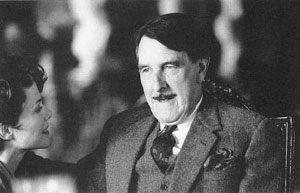
'My love, what danger can befall to you . . . ?'
|
| SCENE 29
INT. RICHARD'S SITTING-ROOM - THE BARRACKS - DAY
RATCLIFFE has lit the coal fire, burning merrily in the grate. The
little table is laid for English breakfast for two.
RICHARD sits and, as RATCLIFFE pours the coffee, opens a letter
with the recognisable Royal Seal that lies next to The Times
newspaper.
RICHARD reads, lights a cigarette and impassively
burns CLARENCE'S
Royal Pardon. He massages comfort into his aching, withered left
hand.
RICHARD
(to CAMERA)
Clarence still breathes.
Edward still lives
and reigns. When they are gone, then shall I count my gains.
Outside, a DRILL-SERGEANT barks orders to his troops. |
scene 29. The Royal Geographical Society's Headquarters, designed
by Norman Shaw (1874) is in Kensington - I would have preferred
rather less spacious accommodation for the bachelor soldier but
sounds of the onscreen barracks' life outside convey the right
atmosphere.
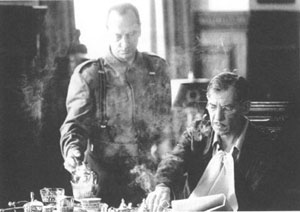
RATCLIFFE pours the coffee.
This is the first chance to register Richard's batman, the
faithful Ratcliffe, who has been with his boss through thick and
thin. Another soldier to whom the army has been everything. It is
a totally professional relationship and he is never an accomplice
to Richard's malevolence. So, Ratcliffe does not witness here the
destruction of the royal pardon which was intended to release
Clarence from The Tower.
|
| SCENE 30
EXT. PARADE GROUND - THE BARRACKS
RICHARD and RATCLIFFE stride briskly past the PLATOON being
exercised by the DRILL-SERGEANT, who salutes as the
Commander-in-Chief goes by.
SCENE 31 DELETED |
scenes 30 and 34 were filmed at Royal Woolwich Arsenal in
south-east London which is now abandoned by the Army and houses a
collection of books from the British Library. Our budget limited
us to hiring only one horse, rather than thirty! And so scene 32
was deleted. |
| SCENE
32
INT. DRESSAGE HALL - THE BARRACKS - DAY
30 unharnessed HORSES are being exercised by their GROOMS,
trotting and walking round the sawdust oval. RICHARD seems to know
each of them, man and beast.
SCENE 33 DELETED |
|
| SCENE 34
INT. STABLES - THE BARRACKS - DAY
There are more immaculately groomed horses in their stalls.
RICHARD pets a couple as he strides along. Then he notices
CORPORAL JAMES TYRELL preparing feed for the regimental mascot, a
huge BOAR. He grinds the mash in a machine and pours it into the
pig-trough.
RICHARD
(to RATCLIFFE)
What is his name?
RATCLIFFE
His name is Tyrell, sir.
RICHARD
I partly know the man.
RICHARD joins TYRELL at the BOAR'S pen. He watches the animal
scoffing the sticky sludge.
RICHARD
Is your name Tyrell?
|
scene 34. Richard Ill's heraldic device was the boar, a
dangerously unpredictable beast, although our ornamental version
seemed happy to crunch all day long on slices of Granny Smith.
|
TYRELL
James Tyrell - and your most obedient servant.
RICHARD
Are you indeed?
TYRELL
Prove me, my gracious Lord.
The ever-discreet RATCLIFFE does not hear what RICHARD says next
to TYRELL. |
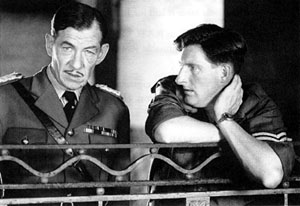
'James Tyrell - and your most obedient servant.'
All the actors were constantly encouraging to me about the film
and some of them about my performance. Adrian Dunbar went further:
between takes he was always ready to discuss our scenes. His most
telling insight was that an actor, when filming, does not need, as
in the theatre, to end a scene with some definite punctuation, the
most obvious and necessary of which is to leave the stage. In
film, it is the director who decides how each scene will develop
into the next. The actors, even when their dialogue is finished,
should always be in some transition of thought or emotion.
'Prove me, my gracious Lord.' I was waiting for RL to call out
'Cut' and for the scene to end, when Adrian passed me the next apple which he
had been ready to throw at the boar. With some venom, I chucked it
at the animal, whose squeal fortuitously provided RL with his
transitional cutting point.
|
|
